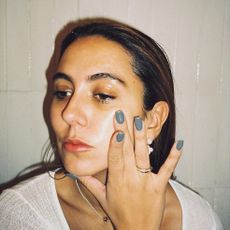This Is the Most Pivotal Serum If You Want Glowing Skin All Year Round
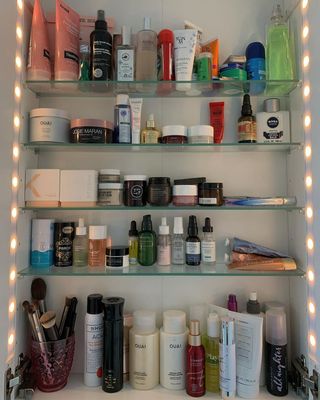
By now, you've likely heard rumblings about antioxidants in skincare (and vitamin C, in particular) and how crucial of a role they can play when it comes to staving off common skin stressors like environmental damage; UV light, blue light, pollution…the list goes on and on. Of course, you can get your daily dose of antioxidants through a variety of vehicles in the skincare department, but we're especially partial to serums here at Who What Wear as they're effortless to apply, fun to shop for, and easy to layer and wear. Plus, if you select one of the best formulas, you'll likely gain a brighter and more radiant complexion to boot.
Antioxidants are known in the industry as being particularly finicky when it comes to quality and stability, and frankly, we had some basic and not-so-basic questions about the ingredient family we wanted to put to the experts. Like, what are the most common and/or most effective types of antioxidants? Can antioxidants be safely used by everybody? And, perhaps our most burning query, which antioxidant serums are the best antioxidant serums? A leading dermatologist and esthetician sound off on all that and more just below. Keep scrolling!
What Are Antioxidants, and How Can They Benefit the Skin?

So, what do vitamins A, C, and E, plus compounds or minerals like resveratrol, copper, zinc, and selenium all have in common? You guessed it, antioxidants.
"Antioxidants are the skin's defense against all kinds of environmental and extrinsic stressors," explains Suneel Chilukuri, MD, FAAD, FACMS. "They work by binding to and neutralizing free radicals to prevent the destruction of healthy cells, therefore inhibiting skin damage. There are intrinsic antioxidant systems that are naturally occurring in the body and also those that are supplemented from the outside, either topically or internally. Antioxidants provide skin protection from air pollution, UVA and UVB rays, ozone pollution, smoke, toxins, and even just our natural metabolic processes." The writing on the wall? Consider antioxidants to be one of the most necessary ingredients to incorporate into your skincare routine if you're looking to maintain a bright and youthful glow, no matter your age, skin type, or skin tone.
What Are the Best Types of Antioxidants to Look for in a Serum?
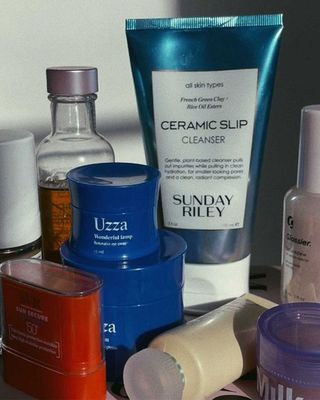
According to Chilukuri, the most commonly used antioxidant is vitamin C especially since the human body lacks the ability to produce vitamin C on its own. Therefore, supplementing our skin with high-quality formulas is key for reaping all of the vitamin's youth-enhancing benefits.
"Vitamin C is hands down my favorite antioxidant," confirms celebrity esthetician and founder of her namesake skincare collection, Angela Caglia. "There are many different forms of vitamin C used in skincare, but I'm a huge fan of the up-and-coming THD form. It’s a lipid-soluble, highly stable form of vitamin C that doesn’t oxidize and turn brown, and is great for all skin types."
Resveratrol is another powerful antioxidant preferred by industry experts and is sourced from red grape skins and knotweed. As Chilukuri points out, the benefits of antioxidants are two-fold, by day, they gift your skin with environmental protection but by night, they can help repair and restore the complexion as you sleep. Resveratrol is a great option for achieving the latter.
How Can You Tell If You're Buying a High-Quality Antioxidant Serum?
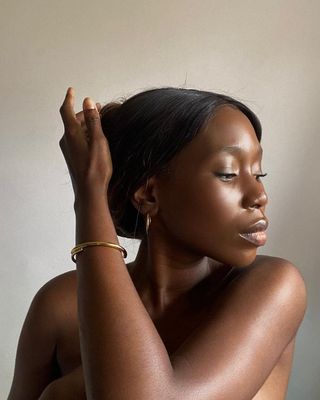
"Many antioxidants are inherently unstable," Chilukuri tells me right off the bat. In fact, he says, that's actually how they're effective and provide their famous benefits. "You want an antioxidant product to be stable on the shelf and reactive in the skin. Some antioxidant ingredients are bound to other molecules to increase their stability, but this also reduces their reactivity in the skin when applied. For example, vitamin C is often paired with vitamin E to stabilize the vitamin C. However, even with this combination, air exposure can rapidly degrade the efficacy of the vitamin C."
To help increase the shelf stability of your antioxidant serum, Chilukuri suggests looking for formulas that utilize strategic delivery technologies and/or have anhydrous or water-free bases to increase shelf stability without compromising the serum's efficacy once you apply it to your skin. Another helpful tip? Take a look at the ingredient label on the product, and note where in the lineup the antioxidants are. As Caglia says, the most potent formulas will have their antioxidants listed at the top, versus the middle or end.
When and How Should You Apply an Antioxidant Serum for Maximum Benefits?

"Vitamin C is typically best applied in the morning, as it has shown an ability to support the efficacy of sunscreen and protect the skin from daytime aggressors," notes Chilukuri. That said, resveratrol is a great antioxidant for nighttime and will help the skin repair and recover while you log precious shut-eye. Both Chilukuri and Caglia recommend you apply your antioxidant serum to clean, dry skin after you've cleansed, and before thicker serums, oils, or moisturizers. "It’s always thinnest to thickest when it comes to the order of your skincare," says Caglia. "As a rule, water-based serums go before oil-based serums and moisturizers."
Are Antioxidants Generally Safe and/or Recommended for Everyone?

For the most part, yes. "Antioxidants are typically beneficial for everyone, you just need to make sure that a product is stable and has a pH that is suitable for that particular antioxidant or blend," explains Chilukuri. "That said, some patients with extremely sensitive or irritated skin may not be able to tolerate the vitamin C until their skin barrier is fully repaired."
You're also going to want to pay heed to the other products you're using in conjunction with your antioxidants. For instance, retinol and vitamin C generally do not a happy couple make. "The pH levels of some vitamin C serums do not interact well with retinol," Caglia warns. "They can cancel each other out, so if you're someone who uses retinol, I generally suggest using antioxidants during the daytime only so they don't interfere with your nighttime retinol protocol."
The Best Antioxidant Serums
The Pro Picks:
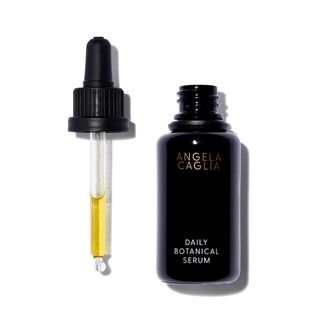
"My Daily Botanical Serum is an organic dry oil packed full of high-powered antioxidants. It’s made with globally sourced organic rosehip oil which is known as Mother Nature’s retinol because it’s so high in vitamin A and C. It also has sea buckthorn which has fifteen times the amount of vitamin C as an orange. Plus, the light aroma of ylang-ylang and frankincense is not only soothing but transforming."—Caglia
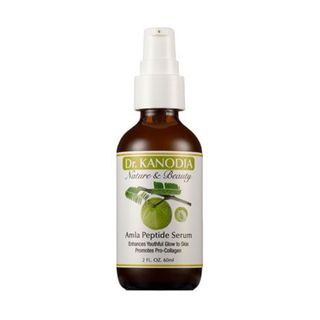
"Dr. Kanodia’s Amla Peptide Serum is one of my favorites. He built his line around the Indian berry Alma which is one of the most powerful sources of Vitamin C and natural antioxidants. It’s lightweight, hydrating, and anti-aging. The serum is packed with glycerin for hydration, plus the Alma berry and peptides for younger-looking skin."—Caglia
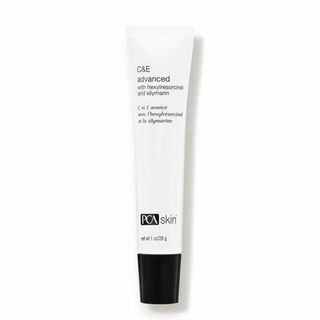
"My favorite antioxidant-rich vitamin C product is PCA Skin's CE Advanced formula. It is one of the most (if not the absolute most) powerful vitamin C and E combination since it is produced in an anhydrous base. As a result, the product is incredibly stable and highly effective at fighting free radicals, minimizing skin discoloration, and strengthening the skin. In addition, the hexaresorcinol that is included in this product further helps reduce skin hyperpigmentation."—Chilukuri
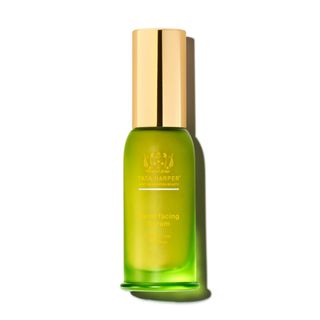
"This Resurfacing Serum from Tata Harper is also a favorite. It's chock-full of antioxidants and boasts brightening, soothing, and plumping perks for the skin."—Caglia
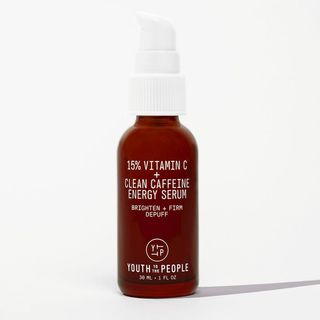
"Youth to the People's 15% Vitamin C + Clean Caffeine Energy Serum is one of my favorite antioxidant serums for the price point. It’s lightweight and refreshing, and I love that the founders are sons of an esthetician too."—Caglia
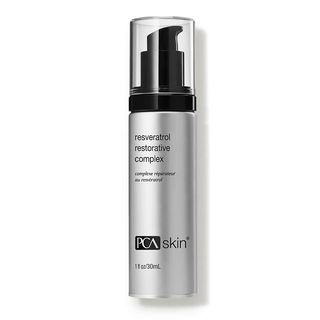
"If you're looking for a reparative antioxidant serum for the nighttime, I really like PCA Skin's Resveratrol Restorative Complex. It blends niacinamide, silymarin, and other advanced botanicals, and it fights the glycation that can lead to premature visible aging. It will also help to repair oxidative damage overnight."—Chilukuri
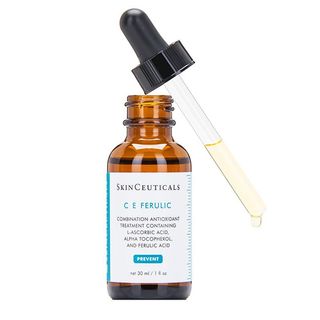
"C E Ferulic is one of the best vitamin C serums and one of the first to market. It still is one of my favorites."—Caglia
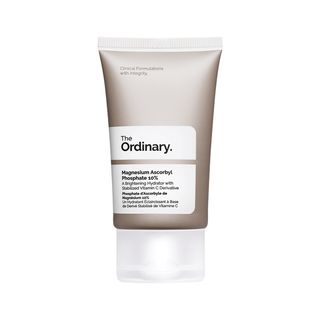
"The Ordinary's Magnesium Ascorbyl Phosphate 10% is a good serum with an even better price point for the budget-conscious customer."—Caglia
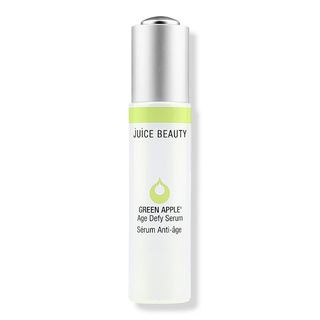
"Lightweight and filled with antioxidants! I recommend it for all skin types with the exception of sensitive skin."—Caglia
The Editor Picks:
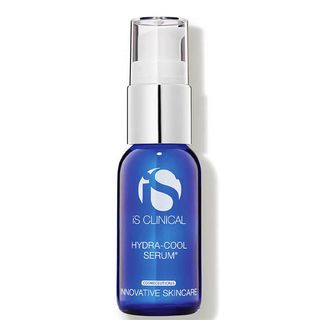
This is a product I began incorporating into my routine a couple of years ago (after two different celebrity facialists, Shani Darden and Melanie Grant) both recommended it to me, and it's done wonders for my skin. It's a hyaluronic acid serum so it nourishes the complexion with lots of hydration, but it also contains Centella Asiatica, a super antioxidant, which staves off premature signs of aging and has helped fade my acne scars and pimple-related pigmentation. I'm hooked for life.
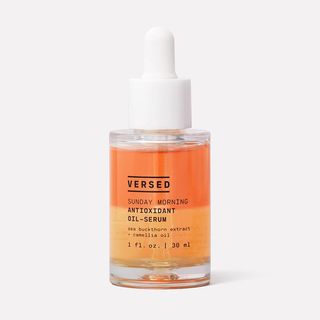
There's so much to love about this unique oil-serum hybrid from Versed—the affordable price tag, the dizzyingly pretty formula (it literally sparkles!), and last but not least, a skin-nourishing load of antioxidants, fatty acids, vitamins, and omegas.
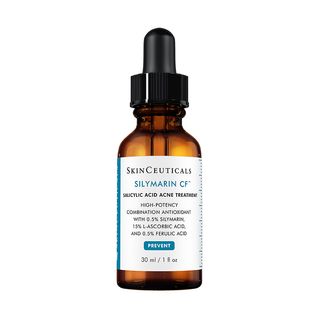
This antioxidant serum is still relatively newish from SkinCeuticals, and it's the only vitamin C serum that hasn't made my skin freak out and burst into a fit of pimples. You can read my full review here, but essentially, it's a sister to the brand's iconic C E Ferulic serum especially geared towards people who veer oily and breakout-prone. My skin has done a complete 180 in terms of clarity, tone, and brightness since I started using it earlier this year.
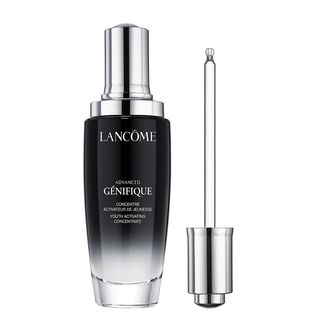
I was a complete newb to Lancôme's skincare lineup until a couple of months ago when I started using this fancy-schmancy serum, and let me just say, it truly does it all. It transforms rough, dry skin into a silky dream, and I swear my skin became significantly softer and brighter after just one use. The glow-inducing results have improved at an exponential rate, and it's also staved off my breakouts. I blame the strategic melding of Bifidus prebiotic—which provides a healthy environment for the good bacteria on your skin to flourish in—plus an ample dose of hyaluronic acid for hydration, vitamin C for antioxidants, and ceramides for a plump, dewy texture.
Next: 3 Things Every Effective Face Serum Needs, According to Derms
Erin has been writing a mix of beauty and wellness content for Who What Wear for over four years. Prior to that, she spent two and half years writing for Byrdie. She now calls Santa Monica home but grew up in Minnetonka, Minnesota, and studied writing, rhetoric, and communication at University of Wisconsin, La Crosse. She studied abroad in Galway, Ireland, and spent a summer in L.A. interning with the Byrdie and Who What Wear family. After graduating from UW, she spent one year in San Francisco, where she worked as a writer for Pottery Barn Kids and PBteen before moving down to L.A. to begin her career as a beauty editor. She considers her day-to-day beauty aesthetic very low-maintenance and relies on staples like clear brow serum (from Kimiko!), Lawless's Lip Plumping Mask in Cherry Vanilla, and an eyelash curler. For special occasions or days when she's taking more meetings or has an event, she'll wear anything and everything from Charlotte Tilbury (the foundations are game-changing), some shimmer on her lids (Stila and Róen do it best), and a few coats of the best mascara-type product on earth, Surratt's Noir Lash Tint.
-
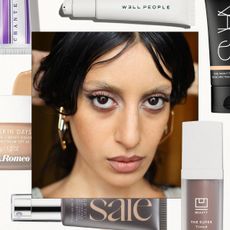 These Undetectable Tinted Moisturizers Actually Meet Our Super-High Standards
These Undetectable Tinted Moisturizers Actually Meet Our Super-High StandardsThey won't let you down.
By Maya Thomas
-
 I Tried This Viral K-Beauty Brand After Discovering It on TikTok and Never Looked Back
I Tried This Viral K-Beauty Brand After Discovering It on TikTok and Never Looked BackEverything is so good.
By Shawna Hudson
-
 Your Official Guide: *The* Best Chemical Peel for Every Skin Type and Concern
Your Official Guide: *The* Best Chemical Peel for Every Skin Type and ConcernWe've got you covered.
By Shawna Hudson
-
 Yes, Algae Can Soothe Sensitive Skin, But It Also Prevents Skin Damage and Aging
Yes, Algae Can Soothe Sensitive Skin, But It Also Prevents Skin Damage and AgingIt's a true multitasker.
By Kaitlyn McLintock
-
 If You Want Baby-Soft Skin This Summer, You Need This Underrated Beauty Tool
If You Want Baby-Soft Skin This Summer, You Need This Underrated Beauty ToolSponsor Content Created With RoseSkinCo.
By Emma Walsh
-
 Alix Earle, Victoria Monét, and Issa Rae Swear By This Red Carpet Body Gloss
Alix Earle, Victoria Monét, and Issa Rae Swear By This Red Carpet Body GlossWe're stocking up on it for summer.
By Kaitlyn McLintock
-
 I've Tried Countless Expensive Serums, But Nothing Tops This $29 One
I've Tried Countless Expensive Serums, But Nothing Tops This $29 OneThis way for compliment-worthy skin.
By Eleanor Vousden
-
 Vanessa Hudgens' Oscars Pregnancy Glow Was Accentuated With This $35 Product
Vanessa Hudgens' Oscars Pregnancy Glow Was Accentuated With This $35 ProductIt's a surprising skincare-makeup hybrid.
By Kaitlyn McLintock

